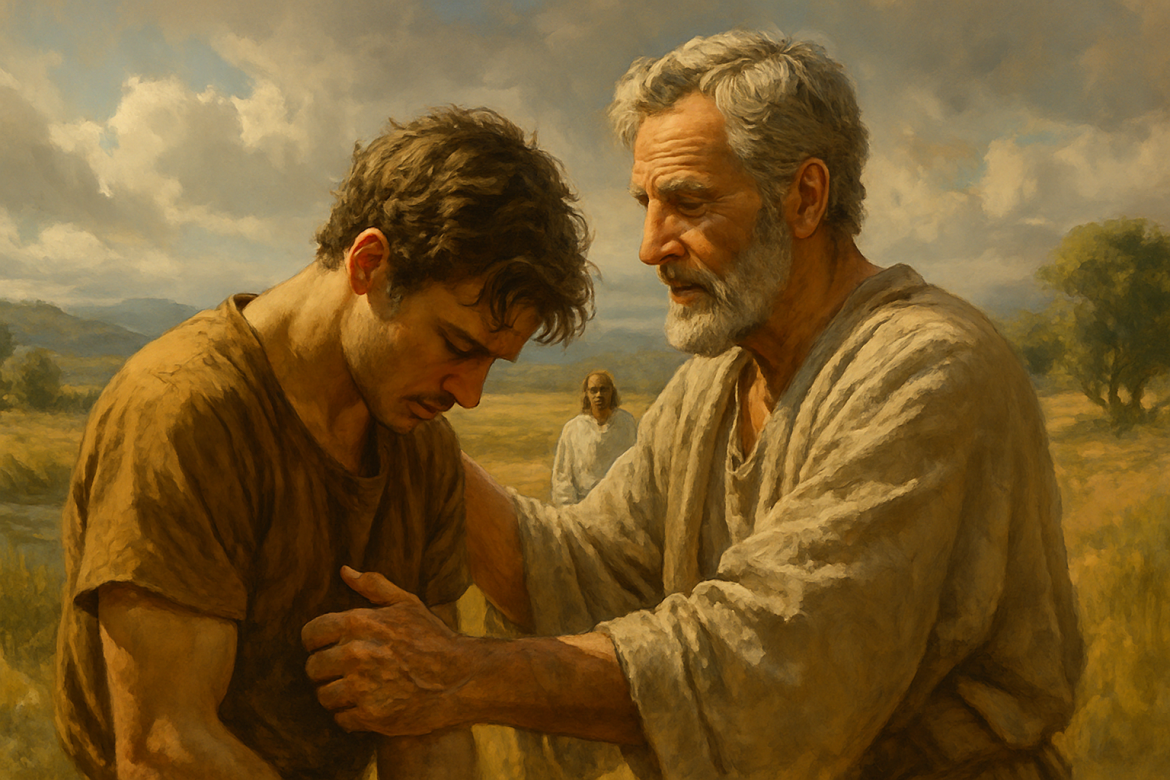Recognizing Sin and Our Need for Salvation
John the Baptist proclaimed, “Repent, and bear fruit in keeping with your repentance” (Luke 3:8). Peter likewise preached, “Repent and be baptized for the forgiveness of your sins, and times of refreshing will come from the Lord” (Acts 3:19). This is the foundation of the gospel: an acknowledgment that we have sinned, and that our only hope is in Jesus, the Savior sent by God. This recognition leads us to faith—believing in Jesus as God’s gift for our salvation.
Repentance: A Change of Mind and Heart
True repentance comes when we realize that our sin nailed Jesus to the cross. He was beaten, whipped, pierced—all for our transgressions. It doesn’t mean we never sin again; John tells us that if anyone claims to be without sin, they make God a liar (1 John 1:10). Paul expressed the same battle, saying, “The things I don’t want to do, I do” (Romans 7:15). This war within—the sin nature—wages against our desire to obey God. But praise be to God through Jesus Christ, who rescues all who call on Him (Romans 7:24-25).
Discipleship: A Life Set Apart
To follow Jesus is to live according to His teachings. His commands never permit sin. Instead, He calls us to holiness—to live separate from the world. Paul wrote to the Ephesians that there should not even be a hint of sexual immorality among God’s people (Ephesians 5:3). Sadly, what was once a hint has become accepted as normal in much of the modern church. But God’s standard has not changed. The cost of sin—Jesus’ life—remains the same. Believe, be baptized, and learn and obey the teachings of Jesus—The Commands of Jesus series.
What Motivates Us: Love for God
God’s motivation was love (John 3:16). Jesus’ love for the Father—and for us—compelled Him to leave heaven and endure suffering. Our motivation must also be love: love for the Father and for Jesus. This love empowers us to pursue holiness, to resist sin, and to press on toward the “high calling” of knowing Christ—even in the fellowship of His sufferings (Philippians 3:10–14).
The law and religion will lead us deeper into sin, but love will set us free from it (John 1:17; Romans 6:14). Hebrews asks, “Have you resisted sin to the point of shedding blood?” (Hebrews 12:4). Love is the only motivator that will enable someone to lay down their life for another—or, yes, as the writer of Hebrews says, shed blood in our attempt at resistance.
As a loyal lover of God, submit to God, resist the devil (sin), and he will flee (James 4:7).
Related:
Breaking Relationship With Sin
Walking with Christ means ending our relationship with sin. Sinful desires must no longer be our companions. If they arise, they are not friends but enemies—snares seeking to drag us away. James warns that temptation starts with our own evil desires and leads to death if unchecked (James 1:14-15). Repentance reorients us toward Jesus and away from sin.
Related:
The Way Forward: Stay Separate, Yet Reach Out
As believers, we are in the world but not of it (John 17:14-16). We are called to love the lost, but not to become one of them. We were once counted among the sinners, but we no longer identify with sin as our lifestyle. Our goal is not isolation but holy outreach—bringing others to God without becoming like the world.
Baptize Pensacola: Obedience to a Loving God
Baptize Pensacola wasn’t a clever ministry idea—it was obedience to a call from God. And as we obeyed, we watched Him move. Still, God’s standards remain unchanged. He is a jealous Lover, as James 4:4 reminds us: “Friendship with the world is adultery against God” (James 4:4). So we ask—has God relaxed His stance on sin? Has He changed the price of righteousness? Paul answers, “By no means!” (Romans 6:1-2)
Repentance Is the Expectation
At Baptize Pensacola we offered, as Christ’s ambassadors, salvation through Jesus. But salvation demands repentance. New believers are like newborns—initially requiring grace and patience. But as they grow, they naturally, as all living things (Romans 1:20) are expected to mature. What was once acceptable becomes unacceptable in the life of a maturing disciple.
Jesus told the crowds, “Unless you eat My flesh and drink My blood, you cannot have any part in Me” (John 6:53). Most walked away at that point. But Peter said, after Jesus asked him and rest of His twelve disciples if they were going to leave Him also, “Where else can we go? You have the words of eternal life” (John 6:68).
Preach repentance from a loving God, Who desires to save them, forgive them, and bring them into His family. Repentance must be preached and expected. Whether God instantly cleanses someone or leads them through a process over months, the direction of our hearts must be toward Jesus, away from sin. Holiness is not achieved by works but by grace—a grace that teaches us to say “no” to sin (Titus 2:11-12).
Related:
A Personal Battle with Sin and the Grace to Overcome
I remember when I said yes to Jesus being the Lord of my life, the battle began. What I used to not even think of as sin—things I once considered normal—I now knew were wrong (John 16:8; Romans 7:7). Yet I was still weak in my walk, and in my knowledge of the Lord and my relationship with Him (Hosea 4:6; 2 Peter 3:18). I could feel in my spirit that this or that was sin, but I had yet to understand it by studying God’s word and being taught.
Those first six months to a year were filled with falls—crashing, standing, falling again—battling to live differently, but growing stronger all the while (Proverbs 24:16). I remember saying, “I don’t care how many times I fall—when I get back up, I’m going to serve the Lord. I’m not leaving Him.” That determination helped me, because the adversary realized he couldn’t get me to leave Jesus by attacking me—it only made me stronger in the Lord (2 Corinthians 12:9–10). His grace truly is sufficient (2 Corinthians 12:9).
Before I was saved, I not only sinned—I looked for opportunities to sin, even paid for the chance to do so (Ephesians 2:1–3). I loved sinning and found pleasure in it, but it was only fleshly pleasure—my spirit man was dead (Romans 8:6–8). But once you’re saved, everything changes, because your spirit is now alive (Ephesians 2:4–5). You avoid sin. You may still stumble at times, but it’s no longer premeditated or planned (1 John 2:1–2). Now, you feel terrible about sin. You feel the pain of it. You feel sorrow that you sinned. Why? Because now you are saved—you’ve come to life (Romans 6:11).
You become aware of your weaknesses and start making life choices to stay far from whatever pulls you in (Romans 13:14; Matthew 26:41). Where once you found pleasure in sin, now you find heartbreak and distance from the very Lord who saved you (Isaiah 59:2; Psalm 51:11). You just want to get rid of it (repent) and return to a close relationship with Him (1 John 1:9; James 4:8).
Coach Bill McCartney, founder of Promise Keepers, once said: “Find out where your line is, then back up ten feet and draw your line there—so that if you fall, you’re still on the right side of the line” (see also Romans 14:13).
An Example of True Repentance
Two women once entangled in a same-sex relationship came seeking spiritual truth. Though they claimed to have left that lifestyle, they still lived and slept in the same bed. The Lord revealed their situation and they were convicted. They repented, moved into separate dwellings, and began to obey God’s instruction. As they did, doors opened—jobs, provision, and hope returned. Their testimony shows how repentance invites blessing.
Fight For and With Them for Their Salvation
Just like when you see a newborn baby, you do not expect them to do mature things. In fact, you expect them to do things that could harm them, so you have to guard them, feed them, change them, help them, and fight for them—until they begin to get their roots down and are able to walk and act on their own (1 Peter 2:2). It’s not much different when someone is freshly born again. You need help! You might be 20, 40, or even 50 years old, but if you’re a new creation in Christ Jesus, you are a newborn in the Spirit (2 Corinthians 5:17), and it will take time to mature and begin to feed yourself spiritually.
That is why you need to stay close to your church family, devouring the Bread of Life—the Word of God (John 6:35)—the teachings and commands of Jesus. As you do, you’ll grow stronger and more rooted in the Lord. If you put what you learn from God into practice, you will become mature in Him, able not only to care for yourself but also to fight for others as others once fought for you (Hebrews 5:14).
To those who help fight for newborns in Christ, be reminded: “God is not unjust; He will not forget your work and the love you have shown Him as you have helped His people and continue to help them” (Hebrews 6:10). As Paul said, “My dear children, for whom I am again in the pains of childbirth until Christ is formed in you…” (Galatians 4:19).
Five Things We Learned
- Repentance is essential—not just for salvation but for ongoing transformation and discipleship.
- God’s standard hasn’t changed—sin still separates, and holiness is still the expectation for His people.
- Love motivates obedience—just as Jesus obeyed out of love for the Father, so must we.
- Repentance leads to blessing—a turn from sin and obedience to God often opens the door to healing and restoration.
- Baptism without repentance is incomplete—it must be coupled with a desire to leave sin behind and follow Christ.





